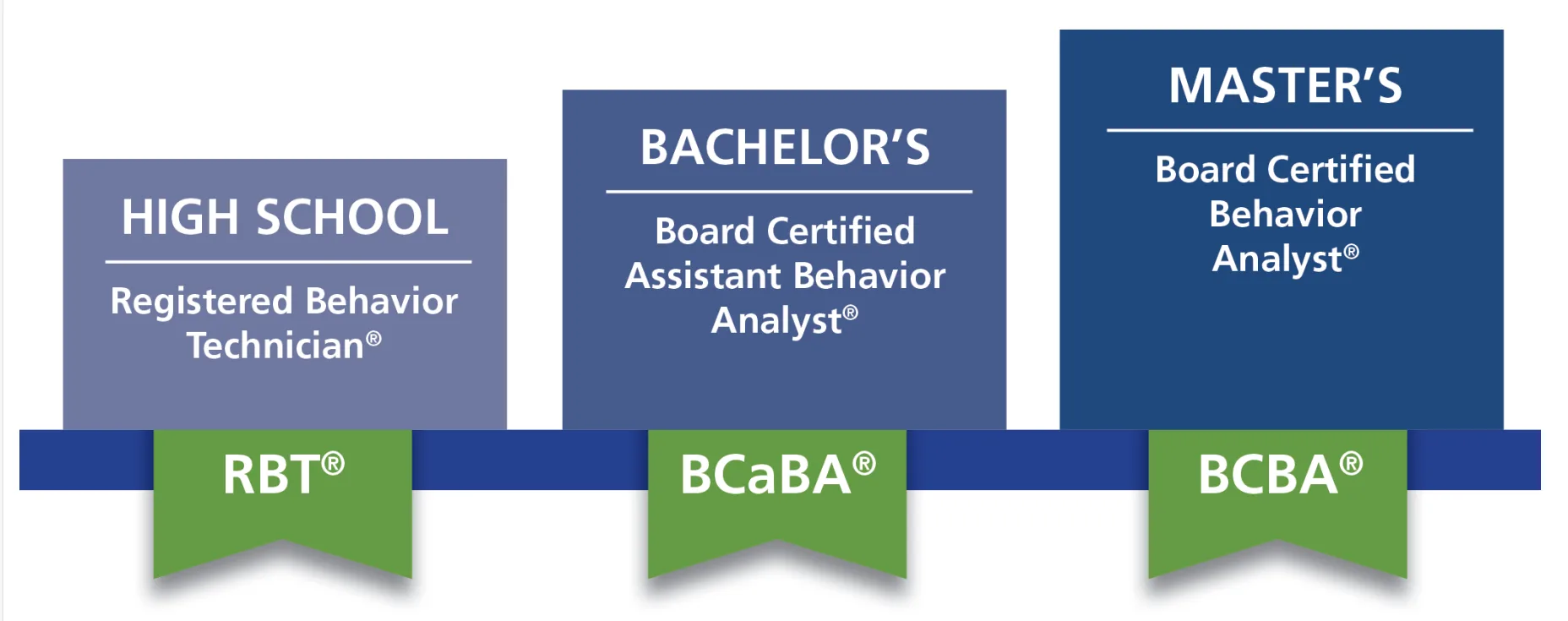Are you currently a Registered Behavior Technician (RBT) looking to advance your career and become a Board Certified Behavior Analyst (BCBA)? For many people in the field of behavior analysis, working as an RBT is the first step to becoming a BCBA. Whether you are just now exploring your options or looking ahead, it’s important to know that becoming a BCBA can be a meaningful way to empower clients and families and improve your skills. Let’s explore the pathway from RBT to BCBA.
What is the difference between an RBT and a BCBA?
The Behavior Analyst Certification Board (BACB) certifies three levels of ABA therapy practitioners:

RBT (high school diploma level)
A paraprofessional in behavior analysis who practices under the close, ongoing supervision of a BCaBA or BCBA. RBTs work with clients one-on-one to help them build behavior skills by implementing the plan that their BCBA creates. RBTs take notes about their clients’ sessions and report them to their BCBA.
BCaBA (bachelor’s degree level)
A Board Certified Assistant Behavior Analyst (BCaBA) is an undergraduate-level professional in behavior analysis who practices under the supervision of a BCBA.
BCBA (master’s degree level)
A graduate-level professional in behavior analysis who can practice independently and provide supervision for BCaBAs and RBTs. BCBAs are responsible for creating treatment plans for behavioral care clients, individualized based on the goals and needs of each client. They analyze client progress over time and apply findings and changes to treatment plans as needed.
Undergraduate degree
While you may not need to pursue a BCaBA certification on your path to becoming a BCBA, you will typically need to earn a bachelor’s degree before completing a master’s degree. Your bachelor’s degree does not have to be in a specific field; however, majors such as psychology, education, or child development can better prepare you for success in an ABA master’s program.
Graduate degree
Becoming BACB-certified as a BCBA requires extensive studying and field experience over many years. The eligibility requirements include:
- A master’s degree or higher from an APBA-accredited program, ABAI-accredited program or recognized behavior analysis degree program
- Visit the ABAI website for a list of accredited master’s and doctoral degree programs
- Defined coursework in behavior analysis
- Supervised fieldwork experience
- A passing grade on the national examination
Supervised fieldwork and the BCBA exam
The BACB defines supervised fieldwork as “the time you spend providing [ABA] services under a qualified supervisor toward BCBA or BCaBA certification.” It is one of the most important eligibility requirements because it helps trainees develop the skills they need to demonstrate competence in ABA and work effectively with clients, their support systems, and others.
Typically, supervised fieldwork is completed through a hands-on practicum as part of your graduate degree program. To be eligible for certification, candidates must complete at least 1,500-2,000 hours of practical fieldwork in a behavior analysis setting. It’s also important to note that you can accrue supervised fieldwork while working as an RBT. Many RBTs work towards becoming a BCaBA or BCBA by gaining professional experience and earning credentials while in the field. At Maxim, we support students through their career progression journey. We dedicate our time to providing all our behavioral care staff with the necessary online and hands-on training to become successful and confident in the field of behavior analysis.
Our BCBAs will mentor and supervise you through your fieldwork hours to prepare you for the certification exam. Under their supervision, you will evaluate patients, develop treatment plans, monitor progress, and work closely with families to encourage positive behaviors. Throughout this process, you will log your activities and hours to meet the fieldwork criteria.
The BCBA qualifying exam is a scaled-score exam, which means you need a specified score to pass. The highest score you can get is 500, but you need 400 or higher to become certified. The exam takes four hours total and covers 160 questions in a computer-based format. You can retake the test eight times within two years.
Behavioral care opportunities at Maxim Behavioral
Maxim Behavioral is currently hiring BCBAs, BCaBAs and RBTs throughout the country. Whether you’re looking for full-time, part-time or day-to-day opportunities, we have a variety of opportunities to accommodate the needs of our behavioral professionals.
At Maxim, our BCBAs generally work as Clinical Supervisors. Our Clinical Supervisors are responsible for:
- Developing treatment plans recommending individualized and evidence-based strategies.
- Providing supervisory oversight to behavioral direct care staff and Assistant Behavior Analysts.
- Monitoring treatment progress and effectiveness to update treatment plans as needed, to support clients’ needs and learning styles.
- Participating in office quality assurance.
To get personalized alerts about open behavioral career opportunities, sign up for our Talent Community!


